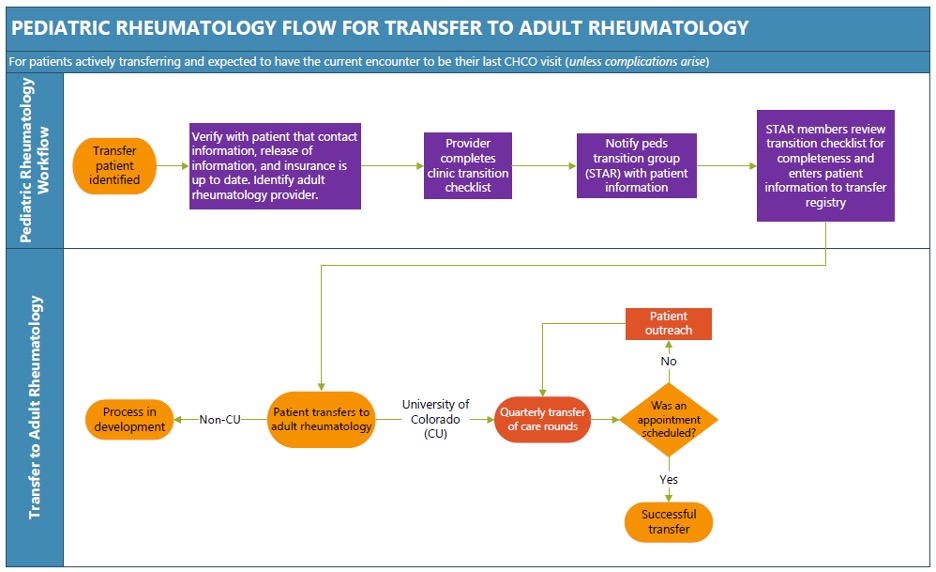Session Information
Date: Tuesday, November 14, 2023
Title: (2039–2060) Pediatric Rheumatology – Clinical Poster III: Potpourri
Session Type: Poster Session C
Session Time: 9:00AM-11:00AM
Background/Purpose: The transfer of care from pediatric to adult rheumatology (AR) is a complex process dependent on communication between medical teams within and across institutions, resource allocation, and patient factors. We outline a successful workflow for the transfer of care that optimizes clinical informatics and includes the creation of a formal collaboration between pediatric rheumatology (PR) and AR.
Methods: In January 2020 a transition-focused partnership was formed between PR and AR physicians, advanced practice providers, nurses, and pharmacists within the University of Colorado (CU)health system. Upon initiation of the transfer process in PR, a standardized electronic medical record checklist is used to guide the transfer workflow and leverage smart data elements to optimize patient tracking. A pediatric transition committee monitors each patient’s transfer progress, ensuring checklist items are complete and initiating direct communication with AR. A cross-institutional transfer log is maintained using a HIPAA-compliant platform. Patients transferring to CU AR are reviewed quarterly at interdisciplinary transfer rounds attended by PR and AR members. Each patient is reviewed to identify barriers for those who have not been scheduled in AR. The records of all patients are periodically reviewed to identify correlates of success as well as risks and system barriers for transfer delays and failures.
Results: The creation of customized templates and data collection tools in the electronic medical record, a cross-institutional patient tracking system, and a collaborative PR-AR transition committee with quarterly transfer rounds have all been sustainable successes. Since the initiation of transfer rounds in January 2022, 54% of patients initially identified as lost to transfer were recaptured, with subsequent successful scheduling in AR. Of the forty-three patients reviewed to date by this committee, only four remain lost to follow-up.
Conclusion: Pediatric and adult rheumatology team members successfully formed an interdisciplinary partnership with a standardized process for identifying and tracking patients who transfer from pediatric to adult care within one health system. Standardized electronic medical record workflows and the use of a PR-AR transfer log help centralize information and facilitate review during transfer rounds, allowing for the identification of system and patient-level barriers. Transfer rounds minimize loss of patient follow-up and facilitate opportunities for iterative changes to the rheumatology transfer process. The establishment of a pediatric and adult subspecialty committee is a sustainable intervention that could be carried out with extramural adult practices and holds promise for improving transfer of care outcomes.
To cite this abstract in AMA style:
Haussmann A, Taylor-Maloney L, Pan I, Nowicki K, Zell J, Moore K. Creation of a Standardized and Collaborative Transfer Process from Pediatric to Adult Rheumatology [abstract]. Arthritis Rheumatol. 2023; 75 (suppl 9). https://acrabstracts.org/abstract/creation-of-a-standardized-and-collaborative-transfer-process-from-pediatric-to-adult-rheumatology/. Accessed .« Back to ACR Convergence 2023
ACR Meeting Abstracts - https://acrabstracts.org/abstract/creation-of-a-standardized-and-collaborative-transfer-process-from-pediatric-to-adult-rheumatology/

